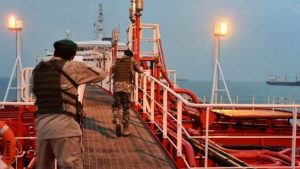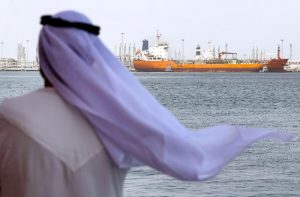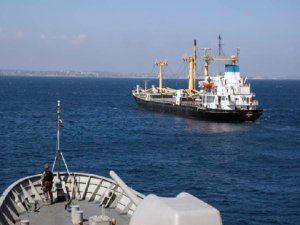
The dramatic seizure of the UK-flagged MV Stena Impero by the Iranian commandos has become a major maritime and global event. International experts claim that it was a retaliation act for the detainment of Iranian tanker Grace 1 in Gibraltar by British forces earlier this month. So, it seems Iranian Revolutionary Guards Corps were just waited for their chance to take revenge.
Seizure of MV Stena Impero
On Friday the 19th of July, at approximately 16:00 BST the UK-registered Oil Product Tanker Stena Impero (49,683 DWT, built 2018) was approached by several small crafts in the Strait of Hormuz with a demand to change the course. Two British battle ships witnessed the scene and ordered the tanker not to obey.
There is a VHF recording between Foxtrot 236 and Iranian military which is most illuminating. Iranians want Stena Impero to alter her course; while British officers claim that tanker’s progress in the international waters must not be interrupted or hindered. Then, Iranian Patrol admits that they plan to board the tanker for the safety inspection. Within minutes Iran’s elite IRGC Special Forces seizes Stena Impero.
The tanker was officially detained for the violation of Iranian maritime laws. Teheran claims that the vessels had switched its tracking systems off leading to the collision with the local fishing boat and was trying to use the southern pass from the Strait of Hormuz despite the established procedure of entering the northern pass.
The Present Situation
Upon the capture, the vessel was escorted to the Iranian port of Bandar Abbas for the investigation. There are 23 crewmembers onboard, citizens of Russia, Latvia, India and the Philippines. The Republic of Iran Broadcasting (IRIB) has released video with the crew of Stena Impero demonstrating that they are in good health and cooperating with authorities on the 23rd of July. Erik Hanell, President and CEO of Stena Bulk, has also confirmed that they have been allowed to communicate with the crew.
Meanwhile, there has been a lot of criticism in the international media concerning British Naval Forces allowing British flagged vessels passing the Strait of Hormuz unguarded. However, while armed guards are highly efficient against pirates it is doubtful that a battleship could have protected a vessel against other military forces without opening fire. Such act would lead to the escalation that all players rather avoid.
Strait of Hormuz – Crucial Chokepoint

Nearly 14.7 million barrels a day (20% of the international oil traffic) have been transported through the Strait of Hormuz during the first 6 months of this year. This is an almost unique thruway for oil developers in the Southern Iraq, parts of Saudi Arabia, United Arab Emirates, Kuwait and Qatar. In addition to the oil traffic, there is a liquefied natural gas export from Qatar; which alone controls quarter of world’s LNG market.
Thus, Iran has demonstrated how easily it can impede shipping in the Strait of Hormuz choking the vital oil and gas shipping. True, the threat is less eminent for Qatar, which has always been in good relationships with Iran; but other neighboring countries might find themselves between the devil and the deep sea.
US president, Donald Trump, is adamant about all his allies supporting his line regarding Iranian nuclear deal. The day before the attack, the military presence in the region was extended “specifically to deter Iran” as confirmed by Cmdr. Rebecca Rebarich, a Pentagon spokeswoman. The US has sent additional military forces to Saudi Arabia for the first time in twenty years.
Yet, if Iran continues, what the EU officials call a ‘state piracy’, the Persian Gulf oil traffic would be paralyzed. The US-led invasion of 2003 has destroyed the Iraqi Strategic Pipeline, so the sea is the only way out for the oil developed in the south.
The same goes for Saudi Arabia. The country has a modern East-West Pipeline which should be transporting up to 5 million barrels per day. But it managed only 2.1 million barrels a day last year; and all this capacity was occupied by refineries in Yanbu.
So, at present the Gulf countries try to distance from the incident as much as possible in exchange for trouble free passes for their vessels, but new safety measures will be imposed for the European companies.
New Safety for the Strait of Hormuz

Following the last Friday’s incident Britain was quick to enlist the support of European neighbors. Diplomats from the UK, France, Germany, Italy, Denmark and Spain met in Brussels on the 23rd of July to discuss safety of shipping in the Strait of Hormuz.
The joint European Naval Mission will escort commercial vessels, conduct surveillance and cooperate with naval patrols in the international waters off Iran and Oman. The plan is to use aircrafts as well as vessels. However, the initiative requires the parliamentary approval in some countries, so will take some time to implement.
Meanwhile, the Strait of Hormuz and the coast of Oman have not been officially included in the list of ITF Warlike and High Risk Zones yet. Therefore, no specific bonuses or additional compensations for passing these areas are included in CBAs.
As for the safety rules in the region, there is an instruction provided by the Maritime Security Centre – Horn of Africa describing crew actions in case of pirates’ attack. Its last points concern military intervention and are applicable in the Strait of Hormuz, i.e.:
- DO keep your hands visible;
- DO keep low on the deck and cover your head with your hands;
- DO be prepared to be challenged on your identity;
- DO cooperate fully with military forces;
- DO NOT make movements that could be interpreted as aggressive;
- DO NOT make photographs;
- DO NOT get involved in activity with military forces unless specifically instructed to.
It seems too optimistic to expect that Tehran and London exchange tankers and their crews; and the navigational situation in the region becomes normal. The seizure of Stena Impero is just the beginning of the new simmering conflict in the region which will bring much inconvenience and strain to the maritime industry.

